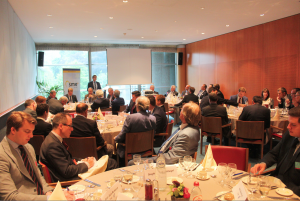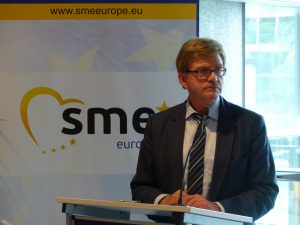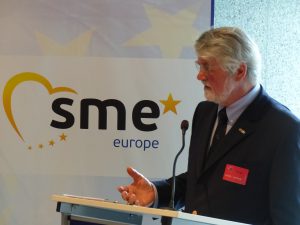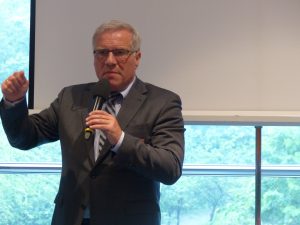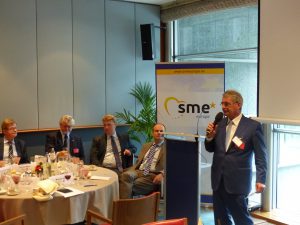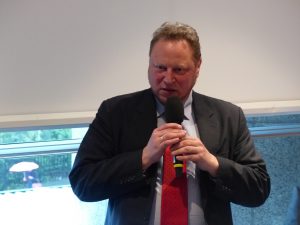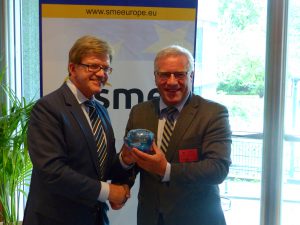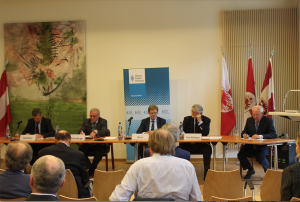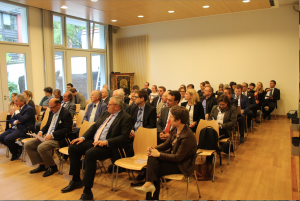Humanitarian and economic challenges through the refugee crisis and migration – What are Europe´s answers?
SME Europe of the EPP was delighted to host a two part debate over the course of a day handling the following issue: “Humanitarian and economic challenges through the refugee crisis and migration – What are Europe´s answers?”
The first part of the debate was held in the Salon des Membres in the European Parliament where the participants enjoyed an agreeable lunch whilst listening to the panel consisting of Dr. Thomas Mann MEP, Johannes Hintersberger (State Secretary of the Bavarian State Ministry for Work, Family, and Social Integration), Rolf Baron von Hohenhau (President of the Taxpayers Association of Europe and President of the Bavarian Taxpayers Association), Eduard Kastner (Senator of the European Economic Senate), and a surprise guest; Michael Köhler (Director Neighbourhood, Directorate-General for Development Cooperation, European Commission).
Dr. Horst Heitz kicked off the days’ activities by welcoming all guests and cooperation partners of SME EUROPE. Mr. Mann then commenced the official programme with his own welcome speech and introduction to the topic. The first aspect Dr.Thomas Mann MEP addressed was his fear that the training of migrants to fulfil roles in society could be separated from that of the indigenous European peoples, this he said, must be avoided at all costs. He also acknowledged that many Europeans today feel that the political scene is running away from this rather controversial topic but however reassured all that this issue is of primary concern for EU level politicians. He also felt it important to distinguish between the classification of different migrant groups such as refugees and economic migrants for example. He also insisted on the availability of language courses for migrants so that they have the linguistic skills to enter traineeships and thus create an integrated working market in the target state.
Rolf Baron von Hohenhau commenced the statements phase of the discussion by agreeing with the urgency for effective integration of Migrants into the work market. He mentioned that whilst indigenous population may make up the numbers of anti-immigration discourse, early settled generations of migrants are also very opposed to the arrival of new migrants. On this point, he further explained that people are not worried by the comparatively small figure of migrants accepted so far, but by what this number may become in the next years through further future intakes. The question he posed from this was how we can modify today´s infrastructure to deal with future influxes of migrants without the politicians losing control of the situation. As a closing remark, he urged the participants to view this discussion from a political standpoint as well as an economic position.
Johannes Hintersberger stated that this situation is perhaps the greatest humanitarian crisis faced since the termination of WWII. He disagreed with Baron von Hohenhau´s assertion that this is a political question, but that rather that it is a generational question. He agreed that integrated work through training and work would be a pillar of success on the path of complete integration for migrants. He connected these points with SME EUROPE`S position by stating that he felt it was important that policy makers should have a strong connection with SMEs and larger corporations in order to integrate the work markets.
Eduard Kastner agreed with the importance of the development of language courses for migrants and also suggested that migrants will probably stay longer in the host country, and therefore, longer term solutions need to be developed to cater for this. He also suggested that the pressure of media attention be removed so that the mechanisms in place can function accordingly.
Wrapping up the lunch discussion Michael Köhler, who extoled the efforts of South German SMEs notably in the Passau region for accommodating migrants in their dealings. Mr. Köhler stated that EU Commission statistics demonstrate that warzones are responsible for producing 80% of directly threatened migrants in refugee category. He said that the question at this point in time should not be a yes or no to migrants, but rather, now they are already here, how will we manage the situation?
These discussion points were put forward to the discussion participants and were discussed later in the second part of the programme in the South Tirolean Representative in Brussels. The Panel experienced a slight reshuffle with the addition of Mr. Herbert Dorfmann MEP and the departure of Mr. Kastler.
Dr. Ingo Friedrich (Former Vice-president of the European Parliament) opened this stage of the discussion by welcoming the participants and presenting the topic and encouraging participation from the audience in terms of interaction with the panel.
The participants all reiterated their arguments and appropriate justifications from the first phase of the discussion. The newest addition to the panel, Mr. Dorfmann now had a chance to add his observations. He started by using South Tyrol as a success story of integration in the past. His next point targeted the classification of migrants, he felt that if different migrant groups could be more easily identified, then many of the obstacles surrounding this debate would be automatically dismantled accordingly.
The interaction from the participants brought the discussion to the realities faced by the lay person. Many showed an interest in what form the language training courses would take, and whether it would also open up work opportunities to youths working in linguistic fields. Another debate sparking point was what the “plan B” would be comprised of if the migrants decided to stay a period longer than five years instead of going back to their countries of origin. Questions were also asked on whether politicians really felt themselves in control of the situation and asked what they thought the EU would look like in twenty years’ time after operating such an immigration policy.

